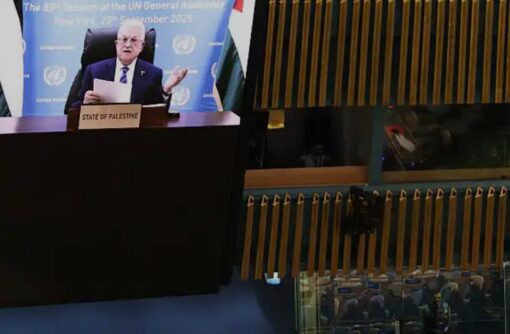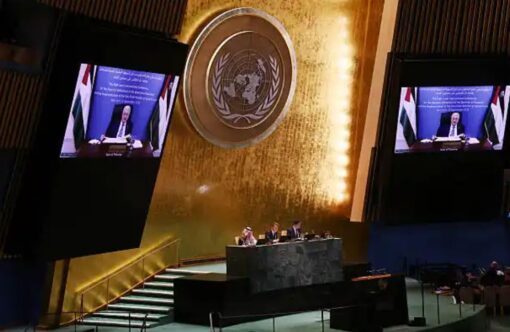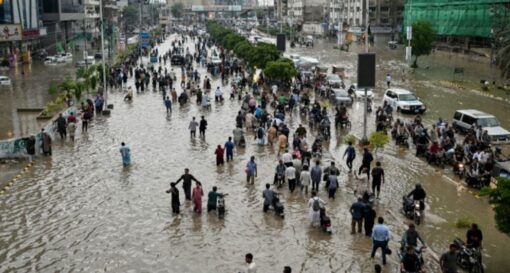New York – Palestinian President Mahmoud Abbas delivered a powerful address to the 79th United Nations General Assembly via video, following the refusal of a U.S. visa that prevented him from attending in person.
His speech focused on the ongoing conflict in Gaza, the suffering of the Palestinian people, and the urgent need for international support to achieve a just peace.
Abbas called for immediate action to end violence, ensure humanitarian aid, and uphold Palestinian rights, reiterating the centrality of Palestine’s sovereignty and Jerusalem as its eternal capital.
Abbas began by emphasizing the resilience of the Palestinian people, both within the homeland and in the diaspora.
“No matter how much our wounds bleed, and no matter how long this suffering lasts, it will not break our will to live and survive,” he said.
He urged the international community to recognize the Palestinian struggle, noting that the dawn of freedom will see the Palestinian flag flying high as a symbol of dignity and steadfastness. Abbas stressed that Palestinians will remain rooted in their lands, drawing strength from their historical and cultural identity.

The president outlined the positions of the Palestinian Authority, calling for a permanent end to the war in Gaza and the unimpeded entry of humanitarian aid. He condemned the use of starvation and blockades as weapons and demanded the immediate release of all hostages and prisoners.
Abbas highlighted the need for the withdrawal of occupation forces from Gaza and the halting of settlement expansion. He emphasized that the Palestinian people must remain on their lands and that reconstruction and recovery plans should be implemented with Arab and international support to protect civilians.
Abbas also called for the release of Palestinian funds withheld by Israel and the lifting of economic restrictions that have contributed to widespread suffering.
Throughout his address, Abbas rejected conflating Palestinian solidarity with anti-Semitism. He thanked global organizations and peoples who had protested in support of Palestinian rights while urging that this support be understood within a framework of peace and justice. “We reject confusing the solidarity with the Palestinian cause and the issue of anti-Semitism, which is something that we reject based on our values and principles,” he said.
Abbas drew attention to the ongoing occupation and the suffering of Palestinians since 1948, describing decades of displacement, aggression, and expropriation of land and property. He lamented the lack of enforcement of over a thousand UN resolutions and criticized repeated international initiatives that failed to end the occupation.
Despite adherence to the 1993 Oslo Accords and efforts to build a modern Palestinian state living peacefully alongside Israel, Abbas noted that Israel systematically undermined agreements and continued policies that exacerbated Palestinian hardship.
The president strongly condemned acts of violence by settlers and militant factions, emphasizing that attacks on civilians do not represent the Palestinian people or their legitimate struggle for freedom.
Abbas affirmed that Hamas would not play a role in governance and that weapons held by all factions must be handed over to the Palestinian National Authority as part of a unified state-building process. He reiterated the commitment to one state, one law, and lawful security forces, emphasizing the rejection of armed governance.
Abbas highlighted settler attacks occurring “in broad daylight under the protection of the Israeli occupation army,” targeting homes, fields, and unarmed civilians.
He also condemned the destruction of religious sites, including mosques, churches, and cemeteries, stressing that these actions violate the historic status quo and international law.
Abbas described Israeli expansion plans, including proposals for a “greater Israel” and annexation projects that threaten the territorial integrity of the West Bank, Jerusalem, and surrounding areas. He called such measures blatant violations of international law and UN Security Council resolutions.
Addressing the humanitarian crisis in Gaza, Abbas described nearly two years of genocide, starvation, destruction, and displacement. He reported that over 220,000 Palestinians, primarily women, children, and the elderly, have been killed or injured.
Abbas characterized Israel’s actions as war crimes and crimes against humanity, emphasizing that these atrocities will be recorded in history and remembered by the international conscience as some of the most egregious in modern times.
Abbas concluded by stressing the Palestinian Authority’s readiness to cooperate with international partners, including the United States, Saudi Arabia, France, and the UN, to implement approved peace plans.
He called for the establishment of governance mechanisms in Gaza under Palestinian administration, supported by Arab and international oversight, to ensure civilian protection and effective administration.
Abbas underlined that the ultimate goal is a unified, independent Palestinian state, free from occupation, with governance structures capable of maintaining security and justice for all citizens.
The president’s address underscored the ongoing violations of Palestinian rights, including displacement, land theft, economic restrictions, and attacks on civilians.
Abbas reiterated the importance of international law and humanitarian principles, calling for global accountability and intervention to protect Palestinian lives and rights.
He emphasized that international support is critical for reconstruction, the return of displaced Palestinians, and the long-term development of Gaza and the West Bank.
Abbas also stressed the broader regional implications of the conflict, warning against conflating support for Palestine with other political agendas.

He reiterated that international solidarity should focus on human rights, justice, and the cessation of violence. His address aimed to mobilize global awareness and action, highlighting the responsibilities of world powers to enforce international law and uphold the principles of peace and human dignity.
The address came amid ongoing discussions at the UN about Israel’s military actions in Gaza and settlement expansions in the West Bank. The speech reinforced the Palestinian position on ending occupation, protecting civilians, and achieving a negotiated peace based on internationally recognized borders.
Abbas’s call for cooperation, accountability, and reconstruction signals a continued commitment to diplomacy and lawful governance despite the ongoing humanitarian crisis.
As the UN General Assembly continues, the international community faces mounting pressure to address both the immediate humanitarian needs in Gaza and the broader political challenges posed by long-term occupation.
Abbas’s virtual appearance highlighted the urgency of action, emphasizing that political resolutions must accompany humanitarian relief to achieve sustainable peace.
The president’s insistence on lawful governance, unity under the Palestinian Authority, and rejection of armed factions in state administration underscores a strategic commitment to institution-building and long-term statehood.
Abbas’s emphasis on rebuilding and protecting Palestinian communities reflects a dual approach: addressing immediate suffering while laying the groundwork for a stable, sovereign state capable of peaceful coexistence with its neighbors.
Abbas’s UN address is expected to influence international discourse on the Israeli-Palestinian conflict, particularly regarding humanitarian access, accountability for violations, and reconstruction efforts.
The speech reaffirms Palestine’s determination to pursue justice through diplomatic channels, international law, and global solidarity, while maintaining the resilience and dignity of its people.


